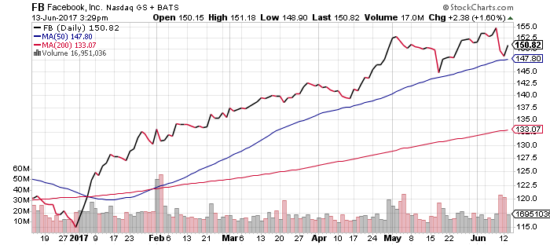
Should You Sell Your Facebook (FB) Stock?
Posted by Crista Huff on Jun 13, 2017 in Famous Stocks, Free Stock Market Content, Growth Stocks | 0 comments
by Crista Huff
As the Chief Analyst at Cabot Undervalued Stocks Advisor, a stock market newsletter, I receive lots of emails from investors. Today, Heidi asked me whether she should sell her shares of Facebook (FB).
That’s a very good question. The answer is going to vary from person to person, because different people have different investment goals. But since she asked ME, and I have a consistent track record of outperforming the stock market for the last 5.5 years, I’ll tell you how I would approach this investment decision. And by the way, this is the same approach that I would take for any similar stock. I don’t let myself get emotionally attached to stocks. That’s why I’m able to sell when it’s time to sell.
Let’s look at earnings growth, value, and the price chart on FB:
-
Wall Street’s consensus earnings per share (EPS) estimates project FB to have 15.1% and 23.4% EPS growth in 2017 and 2018 (December year-end). Those numbers are attractive.
-
The corresponding price/earnings ratios (P/Es) are 30.9 and 25.1. In my investment strategy, I prefer for the P/Es to be smaller than the EPS growth rates. In the case of FB, the 2017 P/E is much higher than the 2017 EPS growth rate, making the stock way overvalued; yet it’s fairly valued based on expected 2018 earnings growth. The stock is definitely not undervalued.
-
FB is up about 35% this year through its June peak, and has not rested very much along the way. That means that the stock is “overextended”, indicating that FB is overdue for a price correction. Stocks aren’t supposed to just go up and up and up without resting, and it’s delusional to think that FB is an exception to the normal order of things. It will, eventually, have a price correction, and rest for several weeks or months.
I sell stocks when they are no longer undervalued. If I owned FB, I would be planning my exit strategy. However, I might approach the sale in different ways. Sometimes I use stop loss orders, sometimes I sell near the top of the recent trading range (in the case of FB, that would be 155), and sometimes I sell right away.
Got questions about stock investing? Email me at Research@GoodfellowLLC.com.
Happy investing!
Crista Huff
President
Goodfellow LLC
* * * * * *
Investment Disclaimer
Release of Liability: Through use of this website viewing or using you agree to hold www.GoodfellowLLC.com and its employees harmless and to completely release www.GoodfellowLLC.com and its employees from any and all liability due to any and all loss (monetary or otherwise), damage (monetary or otherwise), or injury (monetary or otherwise) that you may incur.
Goodfellow LLC and its employees are not paid by third parties to promote nor disparage any investment. Recommendations are based on hypothetical situations of what we would do, not advice on what you should do.
Neither Goodfellow LLC nor its employees are licensed investment advisors, tax advisors, nor attorneys. Consult with a licensed investment advisor and a tax advisor to determine the suitability of any investment.
The information provided herein is obtained from sources believed to be reliable but is not guaranteed as to accuracy or completeness. When information is provided herein from third parties — such as financial news outlets, financial websites, investment firms, or any other source of financial information – the reliability or completeness of such financial information cannot be guaranteed.
The information contained on this website is provided for informational purposes only and contains no investment advice or recommendations to buy or sell any specific securities. This is not an offer or solicitation for any particular trading strategy, or confirmation of any transaction. Statements made on the website are based on the authors’ opinions and based on information available at the time this page was published. The creators are not liable for any errors, omissions or misstatements. Any performance data quoted represents past performance and past performance is not a guarantee of future results. Investments always have a degree of risk, including the potential risk of the loss of the investor’s entire principal. There is no guarantee against any loss.









Leave a Reply